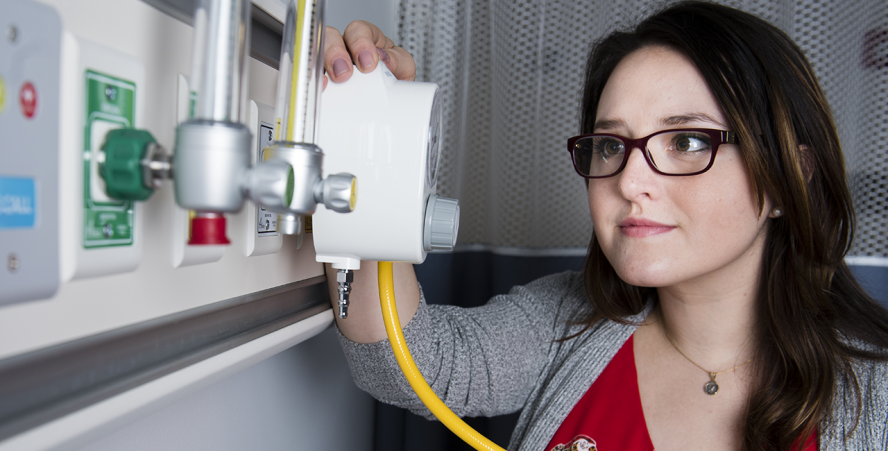Human Factors in Medical Devices and Systems FAQs
Below are a few commonly asked questions related to the Medical Devices and Systems Certificate Program at Tufts School of Engineering.
The program is offered both through a 100% online modality or a hybrid experience with online and in-person courses. If you're ready to apply or want to continue an application, please visit go.tufts.edu/gradadmissions.
Contact Professor of the Practice Michael Wiklund if you have any remaining questions.

-
The rate of preventable deaths due to medical error is huge. A widely cited report published in 2016 suggests at least 250,000 patients die each year due to medical error, making it the third leading cause of death in the USA. A large percentage of these deaths are related to poor user interface design.
Recognizing the medical error "epidemic," the U.S. Food and Drug Administration (FDA) now requires the manufacturers to Class II and III devices to apply HFE through the device development process and validate that representative users can operate them safely. This requirement has increased the demand for professionals in the field of human factors engineering who have special knowledge about the design and evaluation of medical technology.
The Human Factors Engineering Program at Tufts University can help prepare you to enter this exciting field!
-
The program consists of four courses, many available as evening classes. Two of these courses include Medical Fundamentals and Human Factors in Medical Technology. Electives may be chosen from various departments including mechanical engineering, psychology, computer science, occupational therapy, and more. Visit the program requirements page for the list of electives available.
Students interested in earning a master's degree can often apply eligible certificate courses toward a master's degree in human factors engineering.
-
No, just an interest in pursuing human factors within the medical device field is sufficient. However, a background in human factors is likely to helpful in the same way that a background in many other fields (e.g., psychology, engineering, marketing, industrial design, technical communication) might also be helpful.
-
Very applicable. The Human Factors in Medical Devices and Systems certificate program prepares you to conduct many of the fundamental activities you might be asked to perform in a professional human factors role.
The program covers a wide range of human factors techniques for ensuring the safety and efficacy of medical technology. Students learn about global standards and regulations, usability engineering program planning, function and task analysis, user interface requirements, applied user interface design, user interface simulation, design verification, and design validation via usability testing.
These studies are closely linked to the human factors activities specified in global standards and regulations that, generally speaking, must be performed to bring a regulated medical product to market. Applying Human Factors and Usability Engineering to Medical Devices, published by the US Food and Drug Administration, describes the agency’s human factors expectations.
-
Each online certificate course is delivered in a partially synchronous and partially asynchronous manner. The live, synchronous portion of the course involves a weekly, 60-90 minute meeting on Zoom. The remaining, asynchronous portion, consists of recorded lectures to watch, required readings, and special exercises to complete on your own schedule.
Of course, the workloads associated with specific courses vary, as will the level of effort a given student needs to invest to get the most out of their studies. Nominally, a four-credit course might involve 3 hours of classroom work (synchronous and/or synchronous) and perhaps 6-12 hours of additional time spent on readings, assignments, and other exercises. The level of required effort is likely to vary week-to-week.
Students may complete the certificate in as little as 9 months (September to May), but it is also common for a certificate student to take one course per semester. This structure provides flexibility to students who are working full-time, raising a family, or have other time constraints that limit the amount of time available to devote to their studies.
-
Students taking certificate program courses are likely to include students in undergraduate and master’s degree programs (predominantly human factors and biomedical program as Tufts), and professionals from various industries (predominantly the medical, consumer, and software product industries). Studying in the program presents a great opportunity to meet and network with peers who have various backgrounds!
The instructors who have designed and who will teach these courses come from strong industry backgrounds who have experience in leadership, consulting, product development, and engineering roles. These instructors will be your invaluable resources who can provide insight to various industries, mentorship in your new or diverging career path, and teach fundamental human factors skills.
-
Students may only use credits earned at Tufts University to complete the certificate program.
-
You would need to contact the other university to discuss their transfer credit policy.
-
Instructors recognize the challenges of concurrently working and studying. We are likely to permit scheduled absences if they are not frequent, and the student engages in the necessary catch-up activities.
-
Yes, Tufts has established fees for unenrolled students auditing a course. Enrolled students may audit a class with the instructor’s permission, noting that the course will not appear on your transcript, and you will not receive credit.